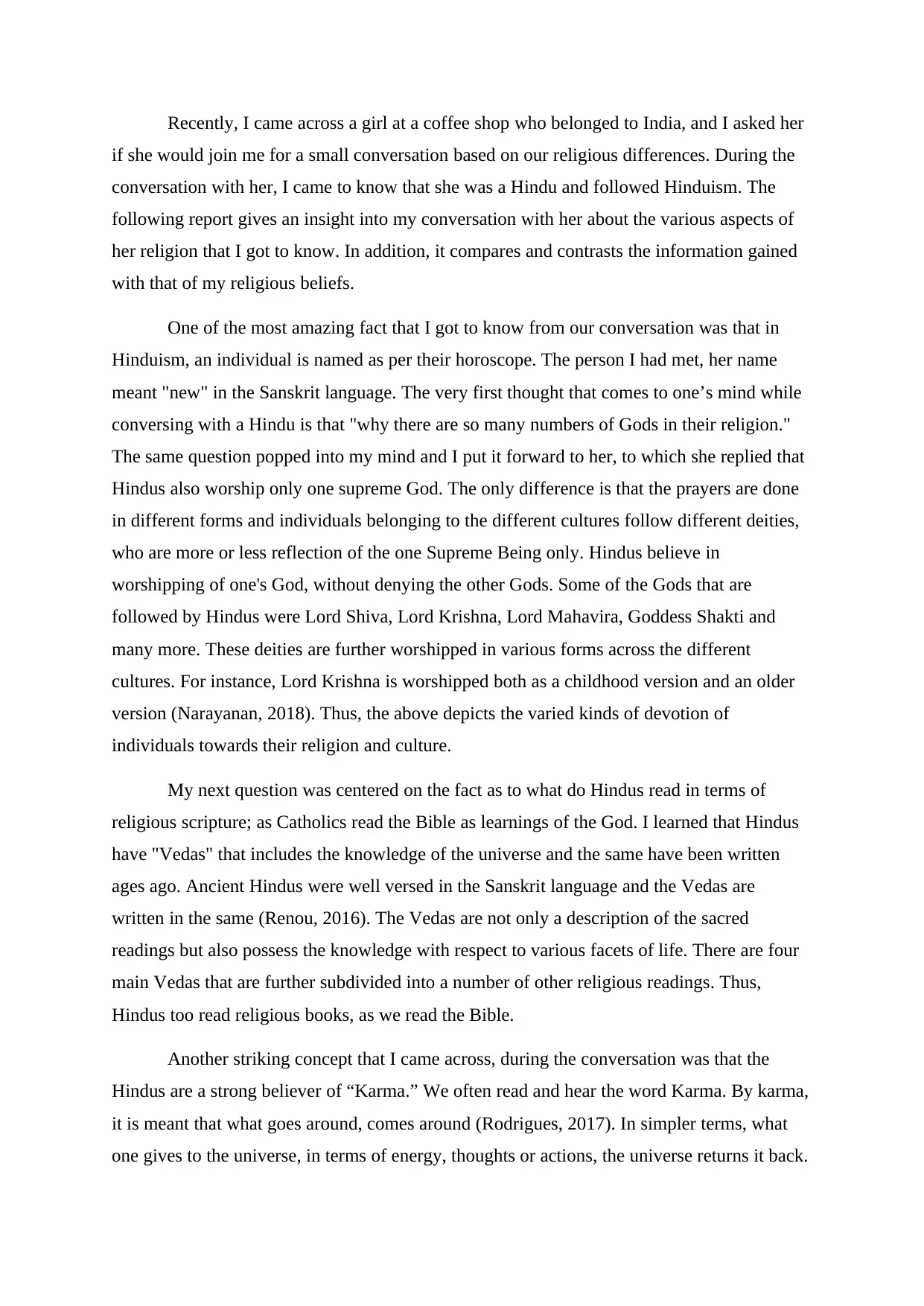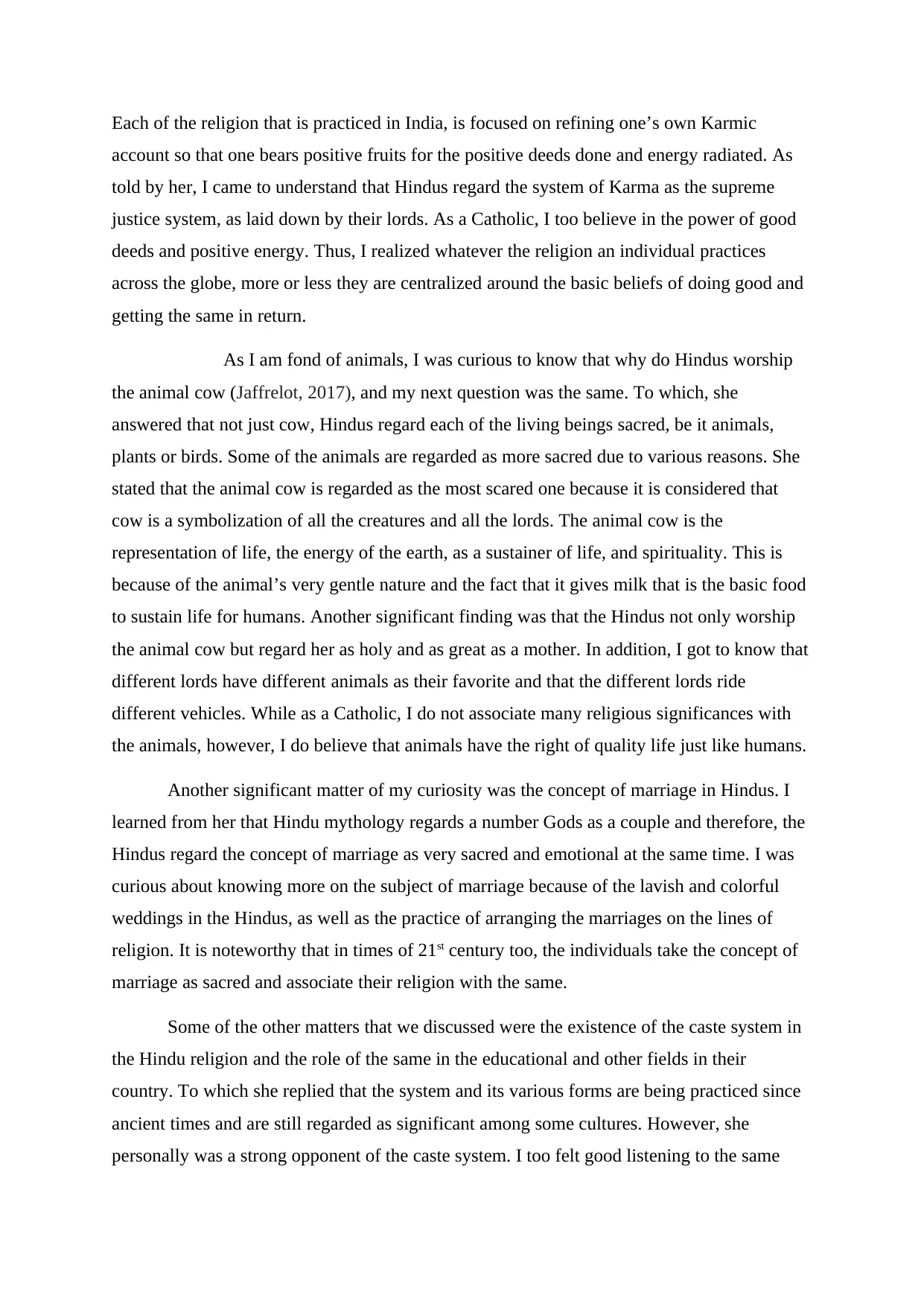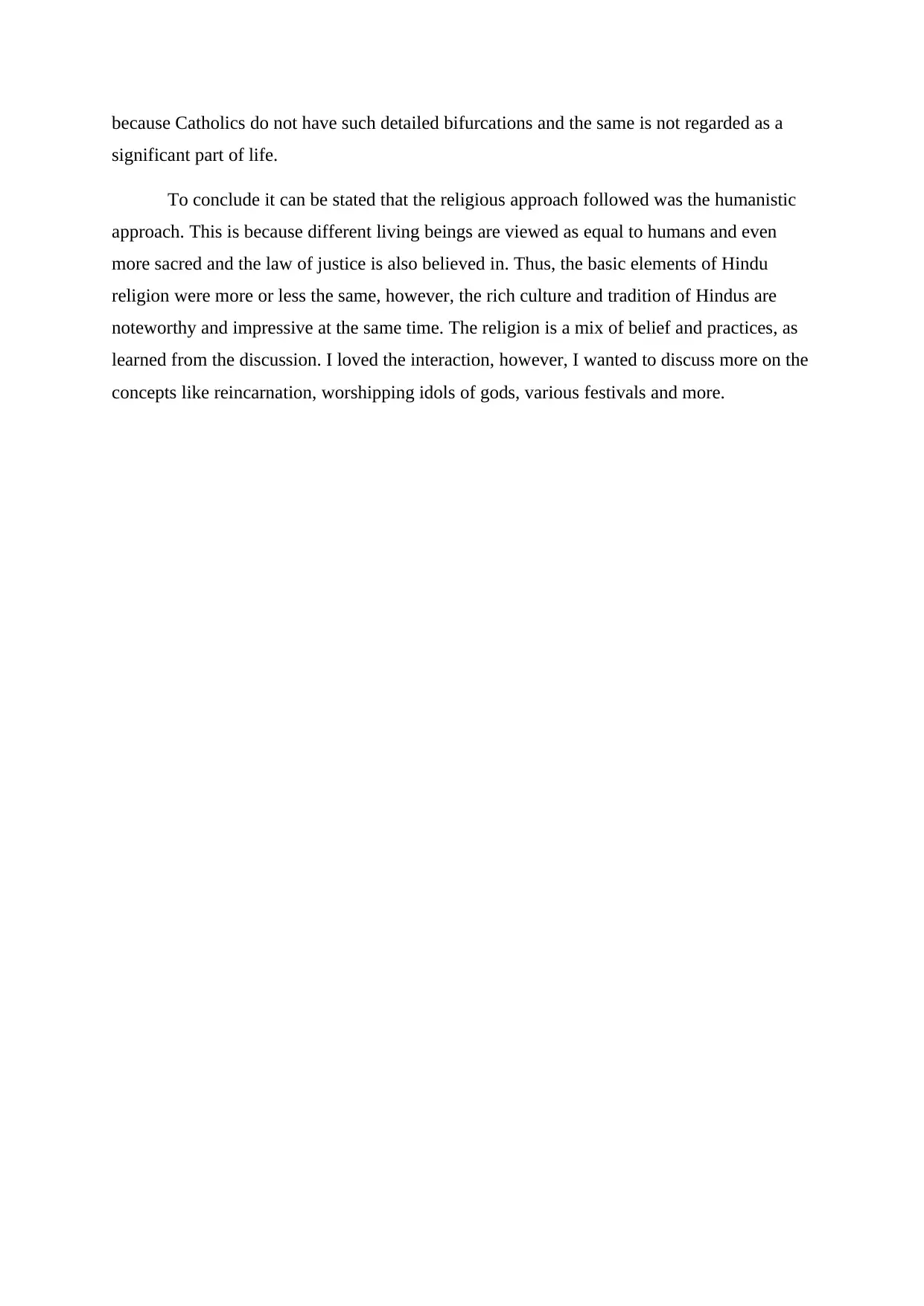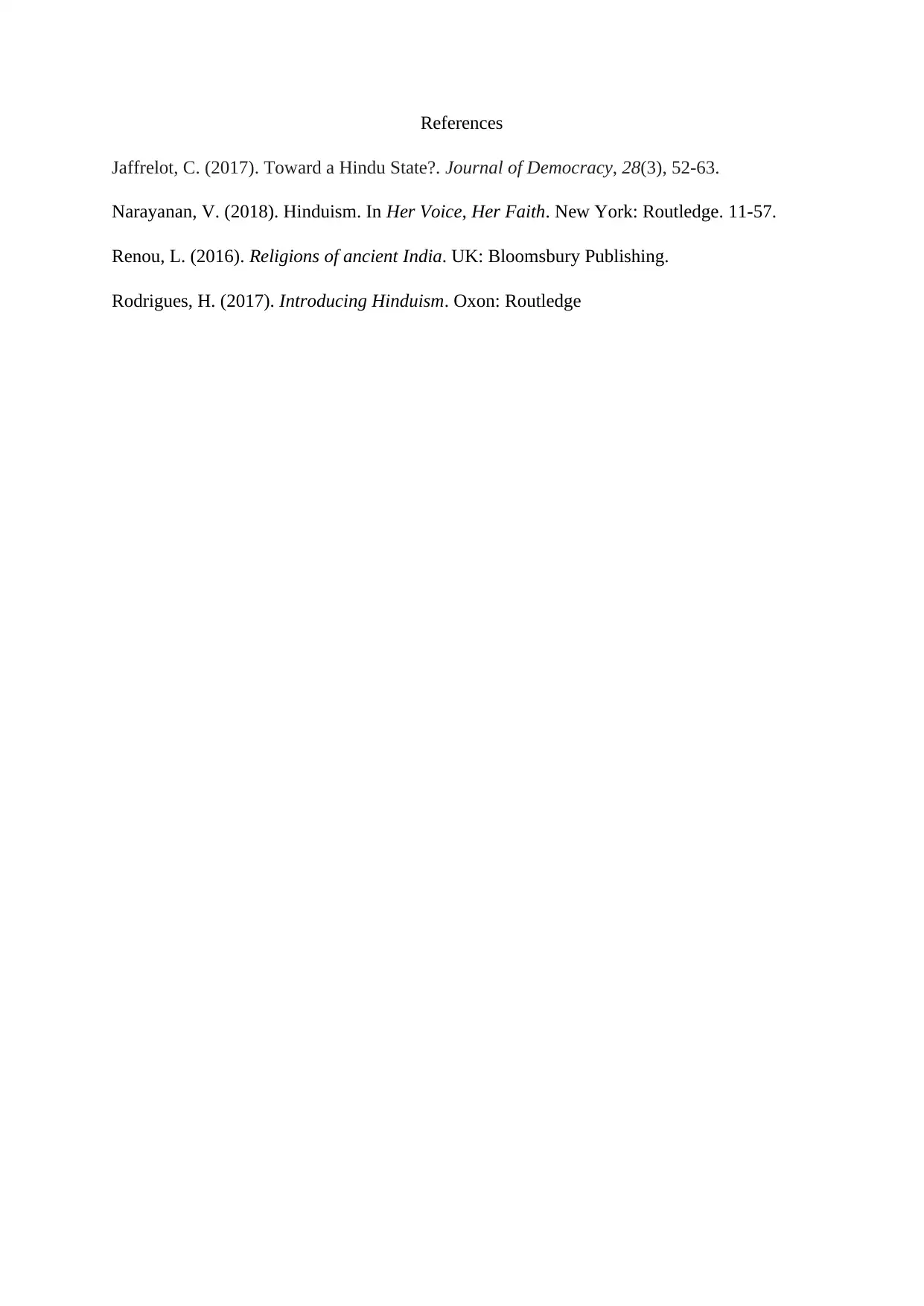A Comparative Analysis of Hindu Beliefs and Catholic Religious Views
VerifiedAdded on 2023/06/03
|5
|1314
|253
Report
AI Summary
This report details a conversation with a Hindu individual, exploring aspects of Hinduism such as the significance of deities, the Vedas, the concept of Karma, the reverence for cows, and the importance of marriage. The report then contrasts these aspects with the author's Catholic beliefs, highlighting similarities in the emphasis on good deeds and differences in cultural practices. The discussion also touches on the caste system within Hinduism. The report concludes that while specific practices differ, both religions share fundamental principles of justice and respect for living beings. Desklib offers similar solved assignments for students.

08 October 2018
Religion
Religion
Paraphrase This Document
Need a fresh take? Get an instant paraphrase of this document with our AI Paraphraser

Recently, I came across a girl at a coffee shop who belonged to India, and I asked her
if she would join me for a small conversation based on our religious differences. During the
conversation with her, I came to know that she was a Hindu and followed Hinduism. The
following report gives an insight into my conversation with her about the various aspects of
her religion that I got to know. In addition, it compares and contrasts the information gained
with that of my religious beliefs.
One of the most amazing fact that I got to know from our conversation was that in
Hinduism, an individual is named as per their horoscope. The person I had met, her name
meant "new" in the Sanskrit language. The very first thought that comes to one’s mind while
conversing with a Hindu is that "why there are so many numbers of Gods in their religion."
The same question popped into my mind and I put it forward to her, to which she replied that
Hindus also worship only one supreme God. The only difference is that the prayers are done
in different forms and individuals belonging to the different cultures follow different deities,
who are more or less reflection of the one Supreme Being only. Hindus believe in
worshipping of one's God, without denying the other Gods. Some of the Gods that are
followed by Hindus were Lord Shiva, Lord Krishna, Lord Mahavira, Goddess Shakti and
many more. These deities are further worshipped in various forms across the different
cultures. For instance, Lord Krishna is worshipped both as a childhood version and an older
version (Narayanan, 2018). Thus, the above depicts the varied kinds of devotion of
individuals towards their religion and culture.
My next question was centered on the fact as to what do Hindus read in terms of
religious scripture; as Catholics read the Bible as learnings of the God. I learned that Hindus
have "Vedas" that includes the knowledge of the universe and the same have been written
ages ago. Ancient Hindus were well versed in the Sanskrit language and the Vedas are
written in the same (Renou, 2016). The Vedas are not only a description of the sacred
readings but also possess the knowledge with respect to various facets of life. There are four
main Vedas that are further subdivided into a number of other religious readings. Thus,
Hindus too read religious books, as we read the Bible.
Another striking concept that I came across, during the conversation was that the
Hindus are a strong believer of “Karma.” We often read and hear the word Karma. By karma,
it is meant that what goes around, comes around (Rodrigues, 2017). In simpler terms, what
one gives to the universe, in terms of energy, thoughts or actions, the universe returns it back.
if she would join me for a small conversation based on our religious differences. During the
conversation with her, I came to know that she was a Hindu and followed Hinduism. The
following report gives an insight into my conversation with her about the various aspects of
her religion that I got to know. In addition, it compares and contrasts the information gained
with that of my religious beliefs.
One of the most amazing fact that I got to know from our conversation was that in
Hinduism, an individual is named as per their horoscope. The person I had met, her name
meant "new" in the Sanskrit language. The very first thought that comes to one’s mind while
conversing with a Hindu is that "why there are so many numbers of Gods in their religion."
The same question popped into my mind and I put it forward to her, to which she replied that
Hindus also worship only one supreme God. The only difference is that the prayers are done
in different forms and individuals belonging to the different cultures follow different deities,
who are more or less reflection of the one Supreme Being only. Hindus believe in
worshipping of one's God, without denying the other Gods. Some of the Gods that are
followed by Hindus were Lord Shiva, Lord Krishna, Lord Mahavira, Goddess Shakti and
many more. These deities are further worshipped in various forms across the different
cultures. For instance, Lord Krishna is worshipped both as a childhood version and an older
version (Narayanan, 2018). Thus, the above depicts the varied kinds of devotion of
individuals towards their religion and culture.
My next question was centered on the fact as to what do Hindus read in terms of
religious scripture; as Catholics read the Bible as learnings of the God. I learned that Hindus
have "Vedas" that includes the knowledge of the universe and the same have been written
ages ago. Ancient Hindus were well versed in the Sanskrit language and the Vedas are
written in the same (Renou, 2016). The Vedas are not only a description of the sacred
readings but also possess the knowledge with respect to various facets of life. There are four
main Vedas that are further subdivided into a number of other religious readings. Thus,
Hindus too read religious books, as we read the Bible.
Another striking concept that I came across, during the conversation was that the
Hindus are a strong believer of “Karma.” We often read and hear the word Karma. By karma,
it is meant that what goes around, comes around (Rodrigues, 2017). In simpler terms, what
one gives to the universe, in terms of energy, thoughts or actions, the universe returns it back.

Each of the religion that is practiced in India, is focused on refining one’s own Karmic
account so that one bears positive fruits for the positive deeds done and energy radiated. As
told by her, I came to understand that Hindus regard the system of Karma as the supreme
justice system, as laid down by their lords. As a Catholic, I too believe in the power of good
deeds and positive energy. Thus, I realized whatever the religion an individual practices
across the globe, more or less they are centralized around the basic beliefs of doing good and
getting the same in return.
As I am fond of animals, I was curious to know that why do Hindus worship
the animal cow (Jaffrelot, 2017), and my next question was the same. To which, she
answered that not just cow, Hindus regard each of the living beings sacred, be it animals,
plants or birds. Some of the animals are regarded as more sacred due to various reasons. She
stated that the animal cow is regarded as the most scared one because it is considered that
cow is a symbolization of all the creatures and all the lords. The animal cow is the
representation of life, the energy of the earth, as a sustainer of life, and spirituality. This is
because of the animal’s very gentle nature and the fact that it gives milk that is the basic food
to sustain life for humans. Another significant finding was that the Hindus not only worship
the animal cow but regard her as holy and as great as a mother. In addition, I got to know that
different lords have different animals as their favorite and that the different lords ride
different vehicles. While as a Catholic, I do not associate many religious significances with
the animals, however, I do believe that animals have the right of quality life just like humans.
Another significant matter of my curiosity was the concept of marriage in Hindus. I
learned from her that Hindu mythology regards a number Gods as a couple and therefore, the
Hindus regard the concept of marriage as very sacred and emotional at the same time. I was
curious about knowing more on the subject of marriage because of the lavish and colorful
weddings in the Hindus, as well as the practice of arranging the marriages on the lines of
religion. It is noteworthy that in times of 21st century too, the individuals take the concept of
marriage as sacred and associate their religion with the same.
Some of the other matters that we discussed were the existence of the caste system in
the Hindu religion and the role of the same in the educational and other fields in their
country. To which she replied that the system and its various forms are being practiced since
ancient times and are still regarded as significant among some cultures. However, she
personally was a strong opponent of the caste system. I too felt good listening to the same
account so that one bears positive fruits for the positive deeds done and energy radiated. As
told by her, I came to understand that Hindus regard the system of Karma as the supreme
justice system, as laid down by their lords. As a Catholic, I too believe in the power of good
deeds and positive energy. Thus, I realized whatever the religion an individual practices
across the globe, more or less they are centralized around the basic beliefs of doing good and
getting the same in return.
As I am fond of animals, I was curious to know that why do Hindus worship
the animal cow (Jaffrelot, 2017), and my next question was the same. To which, she
answered that not just cow, Hindus regard each of the living beings sacred, be it animals,
plants or birds. Some of the animals are regarded as more sacred due to various reasons. She
stated that the animal cow is regarded as the most scared one because it is considered that
cow is a symbolization of all the creatures and all the lords. The animal cow is the
representation of life, the energy of the earth, as a sustainer of life, and spirituality. This is
because of the animal’s very gentle nature and the fact that it gives milk that is the basic food
to sustain life for humans. Another significant finding was that the Hindus not only worship
the animal cow but regard her as holy and as great as a mother. In addition, I got to know that
different lords have different animals as their favorite and that the different lords ride
different vehicles. While as a Catholic, I do not associate many religious significances with
the animals, however, I do believe that animals have the right of quality life just like humans.
Another significant matter of my curiosity was the concept of marriage in Hindus. I
learned from her that Hindu mythology regards a number Gods as a couple and therefore, the
Hindus regard the concept of marriage as very sacred and emotional at the same time. I was
curious about knowing more on the subject of marriage because of the lavish and colorful
weddings in the Hindus, as well as the practice of arranging the marriages on the lines of
religion. It is noteworthy that in times of 21st century too, the individuals take the concept of
marriage as sacred and associate their religion with the same.
Some of the other matters that we discussed were the existence of the caste system in
the Hindu religion and the role of the same in the educational and other fields in their
country. To which she replied that the system and its various forms are being practiced since
ancient times and are still regarded as significant among some cultures. However, she
personally was a strong opponent of the caste system. I too felt good listening to the same
⊘ This is a preview!⊘
Do you want full access?
Subscribe today to unlock all pages.

Trusted by 1+ million students worldwide

because Catholics do not have such detailed bifurcations and the same is not regarded as a
significant part of life.
To conclude it can be stated that the religious approach followed was the humanistic
approach. This is because different living beings are viewed as equal to humans and even
more sacred and the law of justice is also believed in. Thus, the basic elements of Hindu
religion were more or less the same, however, the rich culture and tradition of Hindus are
noteworthy and impressive at the same time. The religion is a mix of belief and practices, as
learned from the discussion. I loved the interaction, however, I wanted to discuss more on the
concepts like reincarnation, worshipping idols of gods, various festivals and more.
significant part of life.
To conclude it can be stated that the religious approach followed was the humanistic
approach. This is because different living beings are viewed as equal to humans and even
more sacred and the law of justice is also believed in. Thus, the basic elements of Hindu
religion were more or less the same, however, the rich culture and tradition of Hindus are
noteworthy and impressive at the same time. The religion is a mix of belief and practices, as
learned from the discussion. I loved the interaction, however, I wanted to discuss more on the
concepts like reincarnation, worshipping idols of gods, various festivals and more.
Paraphrase This Document
Need a fresh take? Get an instant paraphrase of this document with our AI Paraphraser

References
Jaffrelot, C. (2017). Toward a Hindu State?. Journal of Democracy, 28(3), 52-63.
Narayanan, V. (2018). Hinduism. In Her Voice, Her Faith. New York: Routledge. 11-57.
Renou, L. (2016). Religions of ancient India. UK: Bloomsbury Publishing.
Rodrigues, H. (2017). Introducing Hinduism. Oxon: Routledge
Jaffrelot, C. (2017). Toward a Hindu State?. Journal of Democracy, 28(3), 52-63.
Narayanan, V. (2018). Hinduism. In Her Voice, Her Faith. New York: Routledge. 11-57.
Renou, L. (2016). Religions of ancient India. UK: Bloomsbury Publishing.
Rodrigues, H. (2017). Introducing Hinduism. Oxon: Routledge
1 out of 5
Your All-in-One AI-Powered Toolkit for Academic Success.
+13062052269
info@desklib.com
Available 24*7 on WhatsApp / Email
![[object Object]](/_next/static/media/star-bottom.7253800d.svg)
Unlock your academic potential
Copyright © 2020–2026 A2Z Services. All Rights Reserved. Developed and managed by ZUCOL.

